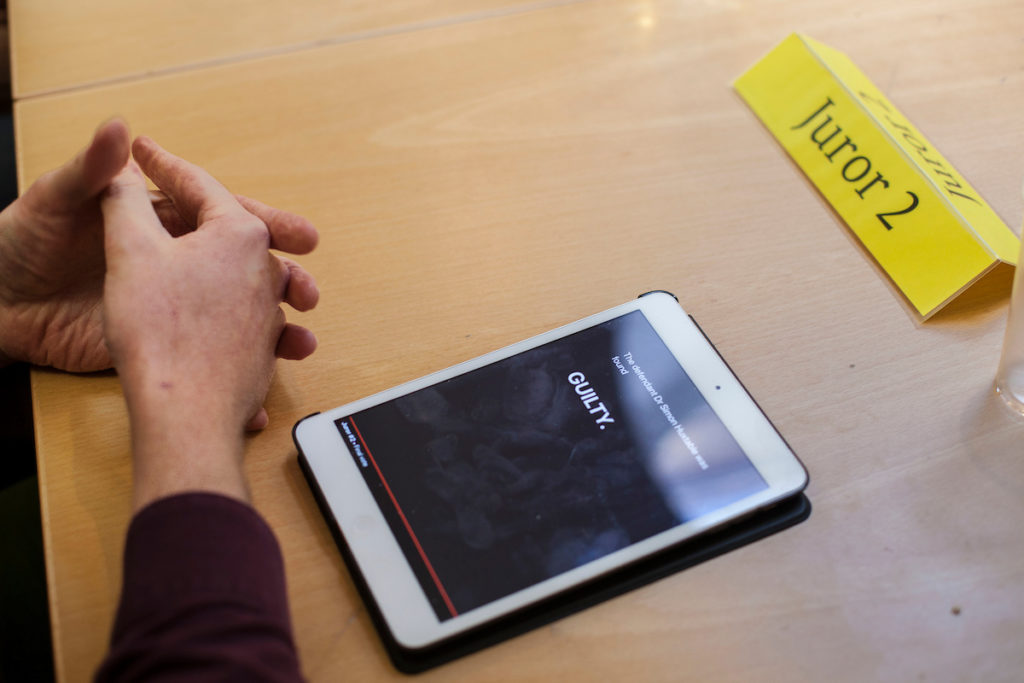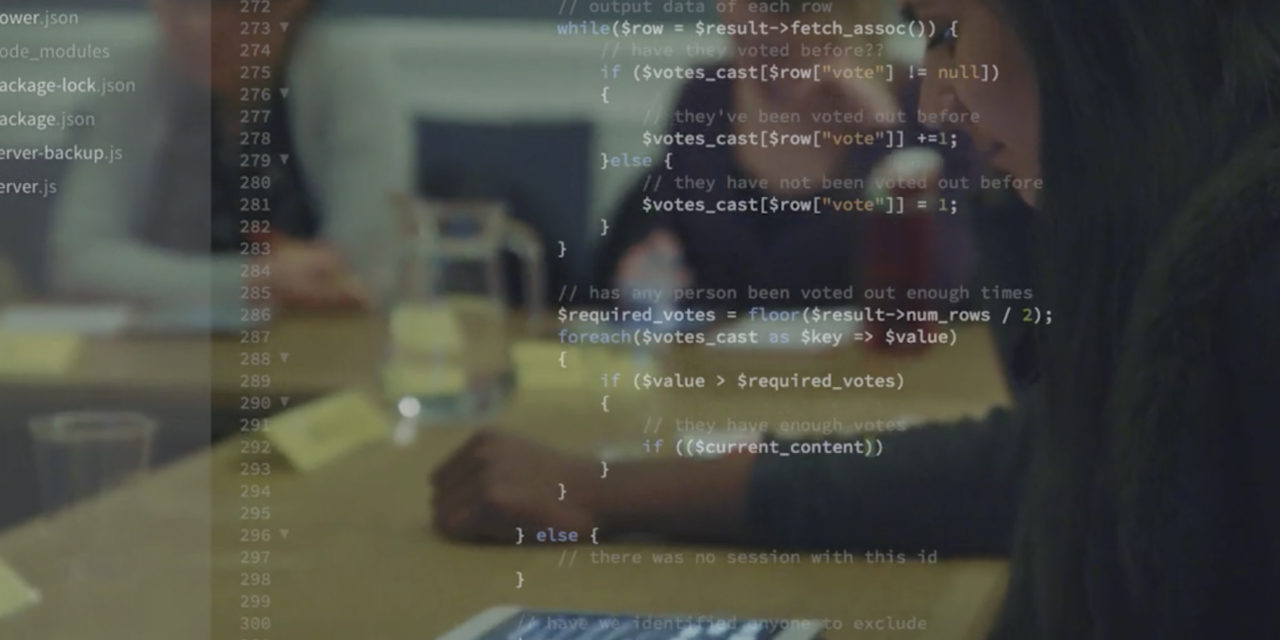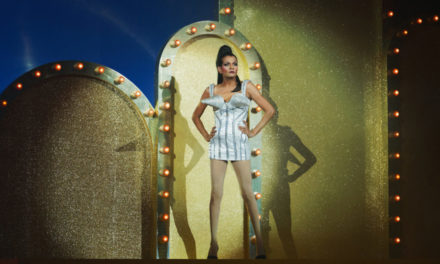An empty room. A large table. 12 iPads, 12 note pads, and 12 name desk holders that designate “Juror” along with a number. That is the simple setting for The Justice Syndicate, a new piece by fanSHEN. This interactive play revolves around a jury deliberation on a high-profile sexual assault case. And while it is not the first attempt to have an audience decide the fate of a court case—there is Ferdinand von Schirach’s Terror, which features a similar premise, and played at the Lyric in 2017—fanSHEN’s production arises as an exceptional instance of interactive theatre that is pushing the dramaturgy of the genre to higher standards.

Pictures in The Sheriff Court Dundee and the Jury Room. Source: The Justice Syndicate. Photo by: Drew Farrell
FanSHEN is an exciting theatre company worth maintaining on our radars. Politically engaged and incredibly playful, they combine performance, game, and research into their theatrical productions. In this way, complex current topics and sociological ideas are synthesized into an experience that the audience will be part of, understand in their own embodiment, and be transformed by. The Justice Syndicate is no exception to this way of working. Combining research on decision making with the most careful design of participatory research, it delivers a mind-changing experience.
The premise of The Justice Syndicate is the court case of Dr. Simon Huxtable, accused by Sally Hodges of sexual assault. The story is delivered to the jurors’ iPads as pieces of evidence for the case. It is easy to imagine how information overload is possible if the audience is swamped with text after text of court arguments. FanSHEN, however, displays masterful theatrical and psychological craft by having the jurors read some of the statements or news coverage, which maintains their engagement with the piece and their personal involvement in the story. Furthermore, each element of the narrative is carefully constructed. Each character, sometimes displayed on videos, is portrayed as complex characters with various possible motives. And, most interestingly considering the topics of the piece, characters and plot are designed to trigger the audience’s biases and most passionate opinions. The Justice Syndicate speaks to current topics such as the Kavanaugh sexual assault accusations and the #metoo movement. In this context, the portrayal of class contrasts between Dr. Huxtable and his wife and Sally Hodges arise also as powerful sources of influence for the audience’s verdict. In this way, fanSHEN crafts an engaging structure to absorb the audience personally.

Picture shows the jury members talking through the de-brief after they came to a verdict after hearing all the evidence. Pictures in The Sheriff Court Dundee and the Jury Room. Source: The Justice Syndicate. Photo by: Drew Farrell
However, the story is just a structure to the core of the piece. The real theatrical experience is the audience interaction. Throughout the 90 minutes in the jury room, the audience members-jurors have several opportunities to discuss whether they consider Dr. Huxtable guilty or not guilty. As time runs out and the final decision approaches, the audience debate intensifies. It is in those discussions that the ideas of the play become fully alive and embodied by the audience. The way they engage with the material and the other spectator defines the spectator’s experience; the play advances mainly through that interactivity without which there would be no theatrical event. The Justice Syndicate fully embodies the essence of interactive theatre by placing audience interaction as the main vehicle for dramatic tension.
The other element that makes The Justice Syndicate stand out is the relationship between psychology research and theatrical experiences. The purpose of the play, as explained by fanSHEN, is “how we fill in the gaps, how we deal with our preconceptions, and how being part of a group can affect all this.” The candent topics of sexism and classism mentioned above are just a vehicle to explore something that underlies human behavior: how we make decisions.
Recent history has made us gape at the outcomes of collective decision making. Elections, referendums, corporate policies…the list is too long to be exhaustive. We stare wide-eyed and wonder how it is all possible. Curiously, we know how. We have known for quite a long time. Social psychology has been looking at the mechanisms of decision making since the 1950s. There have been many interesting discoveries, such as how individuals tend to adjust their opinion to match that of the group, or how people stick to an early decision made for the sake of self-consistency. Most people base their opinions on instincts (what Daniel Kahneman calls System 1 in his book Thinking, Fast and Slow), fed by biases, and stick to them sometimes disregarding evidence. Most of these psychological processes happen automatically and are out of our awareness. They can thus be exploited to influence people’s core beliefs. The only weapon against undesired influences and our own biases is awareness.
I shall not delve too much into psychology and its findings or how each of them is specifically explored in The Justice Syndicate because the piece does a way more wholesome job that this article could ever do justice to, especially in the post-show discussion after each performance. What needs to be appraised though is the fact that Social Sciences research and Theatre successfully collaborate, benefiting from each other in a theatre setting. I approached Dr. Kris de Meyer, the neuroscientist who has worked with fanSHEN in the creation of the piece and asked him about whether there is an intention to publish the findings of the play in a Psychology journal. He responded that they are still collecting data and that could be a possibility in the future. However, the also pointed out that the relationship between The Justice Syndicate and psychology is working on the other direction as well: not only the theatrical piece could give data to the psychology sphere, the psychological sphere is affecting the world directly via the theatrical piece. All the ideas explored in the play are established theories that we somehow have not incorporated yet to help us avoid biases and pernicious sources of influence. Under this lens, The Justice Syndicate becomes a courageous attempt to make sure people question their underlying assumptions by participating in a piece of theatre. If that is not what theatre is for, then what is?
At the end of the performance, I attended, Kris De Meyer and Dan Barnard explained in simple terms what The Justice Syndicate aims to—and, in my opinion, successfully and laudably manages to—do.
“We wanted to immerse you in a playful environment of disagreement so that it will help you afterward, in the larger, real world of disagreement.”
This sentence sets a higher standard of what immersive, participatory, all forms of theatre should be striving to achieve.
This post was written by the author in their personal capacity.The opinions expressed in this article are the author’s own and do not reflect the view of The Theatre Times, their staff or collaborators.
This post was written by Aida Rocci Ruiz.
The views expressed here belong to the author and do not necessarily reflect our views and opinions.


















